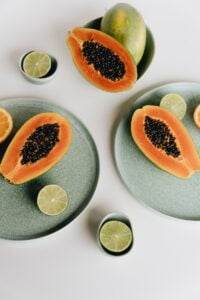A wide variety of vitamins and minerals are necessary for maintaining a healthy body. These essential nutrients are needed for numerous bodily functions, such as bone development and immune system upkeep. We will examine the crucial vitamins and minerals that your body needs for optimum health and wellness in this complete guide.
Table of Contents
Vitamin A: Essential for Health and Wellness
Vitamin A, a crucial fat-soluble nutrient, supports healthy vision, radiant skin, robust immune system, and proper growth and development. This article discusses its importance, dietary sources, and tips for boosting intake.
Vitamin A Benefits
- Healthy Vision: Maintains light-sensitive cells in the retina for low-light and color vision. Deficiency can cause night blindness or complete vision loss.
- Radiant Skin: Promotes cell growth and differentiation, maintains and repairs skin tissues for smooth, supple skin, and may help reduce acne.
- Robust Immune System: Creates and maintains mucosal barriers in the eyes, lungs, and gastrointestinal tract to defend against pathogens.
- Growth and Development: Contributes to forming bones, teeth, and organs, and supports reproductive function in both males and females.
Dietary Sources of Vitamin A
Incorporate these foods for adequate Vitamin A intake:
- Kale: Provides over 100% of the recommended daily value per serving.
- Apricots: Enjoy fresh or dried for a Vitamin A-packed snack.
- Liver: Beef, chicken, or fish liver is nutrient-dense and rich in Vitamin A.
- Other Sources: Sweet potatoes, carrots, and cantaloupe.
Tips for Vitamin A Boost
- Add kale or spinach to salads, smoothies, or stir-fries.
- Snack on dried apricots or use them to sweeten oatmeal, yogurt, or granola bars.
- Occasionally incorporate liver into dishes like liver pâté, liver and onions, or chopped liver.
Incorporating Vitamin A-rich foods into your diet supports overall health and wellness by contributing to vision, skin, immune system, and growth and development.

The Vitamin B Complex: Boosting Energy, Brain, and Skin Health
The Vitamin B complex comprises eight essential vitamins, each vital for various aspects of human health, including energy production, brain function, and skin and hair health.
B Vitamins and Their Benefits
- B1 (Thiamine): Supports healthy metabolism and nervous system. Found in whole grains, legumes, and fortified bread and cereals.
- B2 (Riboflavin): Aids energy production, skin, hair, and vision health. Boosts antioxidant defenses. Found in dairy products, eggs, and leafy green vegetables.
- B6 (Pyridoxine): Enhances brain function, mood, and oxygen transport. Found in poultry, fish, and bananas.
- B3 (Niacin): Promotes skin, nerve function, and digestion.
- B5 (Pantothenic Acid): Essential for hormone production and metabolism.
- B7 (Biotin): Supports healthy skin, hair, nails, and metabolism.
- B9 (Folate): Crucial for DNA synthesis, cell division, and red blood cell production.
- B12 (Cobalamin): Vital for neurological function, red blood cell formation, and DNA synthesis.
Tips to Boost B Vitamin Intake
- Eat a balanced diet with whole grains, beans, dark leafy greens, lean proteins, and dairy products.
- Choose fortified foods, like bread and cereals.
- Supplement B vitamins (e.g., B12) if following a plant-based diet.
Incorporate B vitamin-rich foods to support overall health and well-being.
Vitamin C: Essential for Health
Vitamin C, or ascorbic acid, is a water-soluble antioxidant supporting overall health. This article explores its benefits, food sources, and roles in various bodily functions.
Antioxidant Protection
Free Radical Scavenger: Vitamin C neutralizes free radicals, maintains cellular integrity, and supports overall health.
Immune System Support
Enhancing Immunity: Vitamin C supports white blood cell production and function, and aids in regenerating other antioxidants like Vitamin E.
Collagen Synthesis
Collagen Production: Vitamin C is crucial for collagen synthesis, providing strength and elasticity to skin, tendons, ligaments, and blood vessels.
Food Sources of Vitamin C
Incorporate Vitamin C-rich foods for optimal health:
- Citrus fruits: Oranges, grapefruits, lemons.
- Tropical fruits: Kiwi, pineapple, papaya.
- Cruciferous vegetables: Broccoli, cauliflower, Brussels sprouts.
- Berries: Strawberries, raspberries, blueberries.
In conclusion, Vitamin C provides numerous health benefits, from antioxidant protection to immune support and collagen synthesis. Include a variety of Vitamin C-rich foods in your diet for optimal well-being.
The Sunshine Vitamin: Vitamin D Overview
Vitamin D, the “sunshine vitamin,” is essential for healthy bones and overall well-being. Produced by the body in response to sunlight exposure, it aids in calcium absorption. We’ll explore Vitamin D’s importance, sources, and tips for adequate intake.
Vitamin D’s Role in Bone Health
Vitamin D is vital for:
- Calcium absorption, building and maintaining strong bones and teeth.
- Supporting muscle function and a robust immune system.
Dietary Sources of Vitamin D
Boost Vitamin D levels through sunlight exposure, foods, and supplements:
- Fatty fish: Salmon, mackerel, and sardines.
- Fortified dairy products: Milk, yogurt, and cheese.
- Mushrooms: Shiitake and maitake mushrooms.
- Egg yolks: Modest Vitamin D source.
- Fortified plant-based milk alternatives: Almond, soy, and oat milk.
Tips for Adequate Vitamin D Intake
- Sunlight exposure: Moderate sun exposure, considering skin type, time of day, and location.
- Diverse diet: Include Vitamin D-rich foods in daily meals.
- Supplementation: Consult a healthcare professional if needed.
Vitamin D is essential for optimal bone health and overall wellness. By understanding its importance, incorporating rich dietary sources, and ensuring adequate sunlight exposure, you can harness the benefits of the “sunshine vitamin” and support your body’s well-being.

Vitamin E: Antioxidant for Immune Function & Cellular Communication
Vitamin E, a fat-soluble antioxidant, is essential for human health. It defends cells from oxidative damage and is found in various foods. We’ll explore its importance, sources, and benefits for immune function and cellular communication.
Role of Vitamin E in the Body
- Antioxidant Powerhouse: Neutralizes free radicals, preventing chronic diseases and supporting overall health.
- Immune Function: Assists in immune cell production and regulation, helping combat infections.
- Cellular Communication: Facilitates cell signaling, essential for physiological processes and maintaining balance.
Dietary Sources of Vitamin E
Include Vitamin E-rich foods in your diet:
- Sunflower seeds: Nutrient-dense and provide substantial Vitamin E.
- Almonds: A satisfying snack with significant Vitamin E content.
- Avocado: Source of healthy fats and Vitamin E.
- Vegetable oils: Sunflower, safflower, and wheat germ oil are rich in Vitamin E. Consume in moderation.
Tips to Boost Vitamin E Intake
- Incorporate nuts and seeds: Add almonds or sunflower seeds to oatmeal, yogurt, or salad.
- Get creative with avocado: Use avocado as a spread, blend it into smoothies, or add to salads.
- Choose Vitamin E-rich oils: Opt for sunflower or safflower oil when cooking or preparing dressings.
Incorporating Vitamin E-rich foods and following these tips support your body’s health and well-being.
Vitamin K: Essential for Blood Clotting and Bone Health
Vitamin K, a crucial fat-soluble nutrient, supports blood clotting and bone growth. Including foods like broccoli, Brussels sprouts, and dark leafy greens in your diet can help maintain sufficient Vitamin K levels for overall health.
The Importance of Vitamin K
- Blood Clotting: Produces proteins for blood coagulation, preventing excessive bleeding.
- Bone Health: Contributes to bone metabolism, calcium regulation, and osteocalcin activation for improved bone density.
Top Vitamin K Food Sources
- Broccoli: Rich in Vitamin K, Vitamin C, fiber, and potassium.
- Brussels Sprouts: Packed with Vitamin K, fiber, antioxidants, and essential vitamins and minerals.
- Dark Leafy Greens: Excellent Vitamin K sources; also provide fiber, iron, and other nutrients.
- Other options include green beans, cabbage, and fermented soy products like natto.
Tips for Boosting Vitamin K Intake
- Add dark leafy greens to salads or smoothies.
- Roast or steam broccoli and Brussels sprouts for side dishes or stir-fries.
- Pair Vitamin K-rich foods with healthy fats like olive oil or avocado for better absorption.

Calcium: Essential for Bones and More
Calcium is the body’s most abundant mineral, crucial for healthy bones, teeth, muscle function, nerve transmission, and blood clotting. This section highlights calcium’s importance and the best sources for adequate intake.
Calcium’s Functions
- Bone health: Primary building block of bones, helps maintain density and prevent osteoporosis.
- Muscle function: Enables smooth muscle contractions, prevents cramps, and irregular heartbeats.
- Nerve transmission: Supports message transmission between nerve cells and the body.
- Blood clotting: Critical for clot formation and preventing excessive bleeding.
Calcium-Rich Foods
Include these calcium sources in your diet:
- Dairy products: Milk, cheese, and yogurt provide a readily absorbable form of calcium.
- Broccoli: A good source of calcium, especially for lactose intolerant or plant-based diets.
- Calcium-fortified foods: Orange juice, plant-based milk alternatives, and certain tofu types.
- Other sources: Almonds, kale, canned salmon with bones, and sardines.
In conclusion, understanding the importance of calcium and consuming a variety of calcium-rich foods supports your body’s functions and promotes optimal health.
Iron: Vital for Oxygen Transport
Iron is crucial for oxygen transportation in the body. As a key component of hemoglobin, iron is essential for health. We will explore iron’s significance, risks of insufficient iron levels, and dietary sources.
Hemoglobin and Iron’s Importance
- Hemoglobin: Iron-rich protein in red blood cells; transports oxygen and returns carbon dioxide.
- Cellular Respiration: Iron’s role in oxygen transportation is critical for energy production; inadequate iron levels can cause fatigue.
Consequences of Iron Deficiency
- Iron-Deficiency Anemia: Insufficient iron leads to inadequate red blood cells and hemoglobin, causing fatigue, weakness, pale skin, and shortness of breath.
- Risk Factors: Pregnant women, menstruating individuals, vegetarians, and those with malabsorption issues should monitor iron intake and consider supplementation.
Dietary Sources of Iron
- Red Meat: Beef, lamb, and venison are excellent sources of heme iron, which is easily absorbed.
- Lentils: Rich in non-heme iron, found in plant-based foods; add to soups, stews, and salads.
- Fortified Grains: Cereals, breads, and pastas fortified with iron provide an additional dietary source.
Enhancing Iron Absorption
- Consume Vitamin C: Boosts non-heme iron absorption; eat citrus fruits, bell peppers, and strawberries.
- Avoid Inhibitors: Calcium and tannins in tea and coffee inhibit iron absorption; consume separately from iron-rich foods.
In conclusion, iron is vital for oxygen transportation. Ensuring adequate intake through a balanced diet and understanding iron absorption helps prevent iron-deficiency anemia and promotes overall health.

Magnesium: Essential for Health
Magnesium is a vital mineral for numerous bodily functions and overall well-being. This article explores its benefits, roles, dietary sources, and tips for boosting intake.
Magnesium’s Key Roles
Magnesium is involved in over 300 enzymatic processes, including:
- Energy Production: Aids in converting food into energy (ATP).
- Muscle Function: Regulates calcium flow in muscle cells for smooth movements.
- Nerve Signaling: Helps maintain ion balance across cell membranes for efficient nerve communication.
Magnesium-Rich Foods
Incorporate these foods to ensure adequate magnesium intake:
- Spinach: 157 mg per cooked cup.
- Pumpkin Seeds: 168 mg per ounce.
- Dark Chocolate: 64 mg per one-ounce serving of 70-85% dark chocolate.
Tips to Boost Intake
- Diversify meals with magnesium-rich nuts, legumes, and whole grains.
- Choose mineral or spring water containing magnesium.
- Consult a healthcare provider before taking magnesium supplements.
Incorporating magnesium-rich foods and following these tips will support energy production, muscle function, and nerve signaling for optimal health.
Zinc: Essential for Health and Wellness
Zinc, a vital trace mineral, has significant health benefits and plays key roles in various bodily functions. Zinc supports immune function, protein synthesis, and wound healing. Including zinc-rich foods and maximizing absorption promotes overall health and wellness.
Zinc’s Importance in the Body
- Immune Function: Supports immune cell development and function.
- Protein Synthesis: Involved in cell creation, DNA replication, and cell division.
- Wound Healing: Helps maintain skin integrity and supports cell growth, collagen synthesis, and immune response.
Zinc-Rich Foods
Incorporate zinc-rich foods for optimal health:
- Oysters: A top source of zinc.
- Beef: Good source; choose lean cuts.
- Chickpeas: Plant-based source suitable for vegetarians and vegans.
- Pumpkin seeds: Provide zinc, magnesium, healthy fats, and fiber.
- Lentils: Rich in zinc, protein, fiber, and iron.
Tips to Boost Zinc Absorption
- Combine zinc-rich foods with vitamin C-rich foods.
- Soak, ferment, or sprout plant-based zinc sources to reduce phytic acid.
Conclusion
it is crucial for preserving the best possible health and wellness to eat a variety of foods that are high in vital vitamins and minerals. You can make sure that your body gets all the nutrients it needs to perform at its peak by including a range of essential nutrients in your diet.
FAQs About Vitamins and Minerals
Q. Why are minerals and vitamins critical to my health?
Vitamins and minerals are essential for various bodily functions, such as bone formation and immune system upkeep. They are necessary for preserving the best possible health and well-being.
Q. What are some places where I can get the vitamins and minerals I need?

A number of foods, such as dark leafy greens, dairy goods, whole grains, meat, fish, nuts, seeds, and fortified cereals, are high in vital vitamins and minerals.
Q. What are some of the health advantages of taking vitamins and minerals?
Getting enough of the important vitamins and minerals in your diet will help you maintain a variety of health advantages, including strong bones and teeth, normal muscle and nerve function, a healthy immune system, glowing skin, and more.
Q. How can I make sure that my diet has the right amount of vitamins and minerals?

A balanced diet full of nutrient-dense foods is the best way to guarantee that you are getting enough of the vital vitamins and minerals you need. You can make sure that your body gets all the nutrients it needs to perform at its peak by including a range of essential nutrients in your diet.
Q. Can taking too many vitamins and minerals be bad for you?
Absolutely, taking too many vitamins and minerals might have negative effects. Before taking any supplements, it’s crucial to follow the prescribed daily consumption recommendations and speak with a medical expert.
